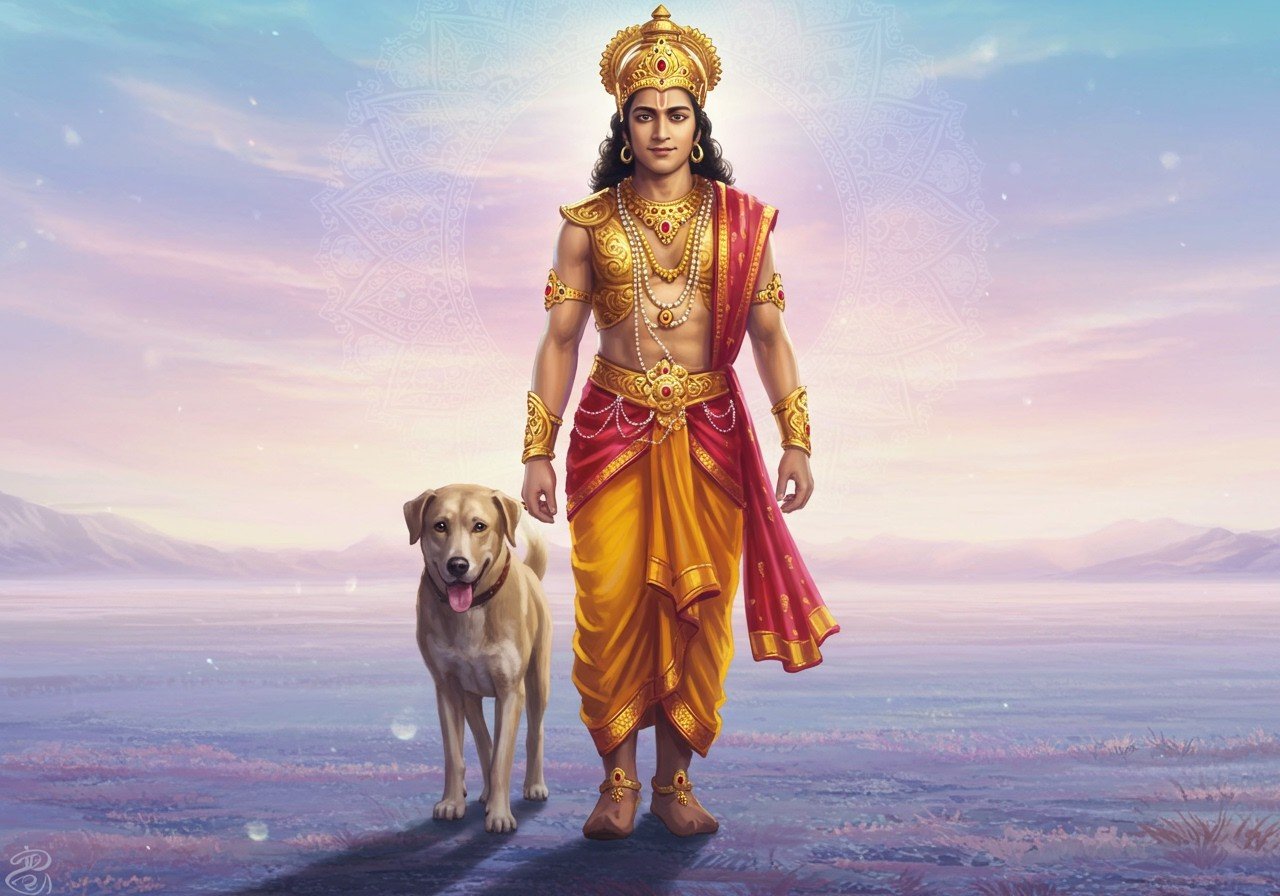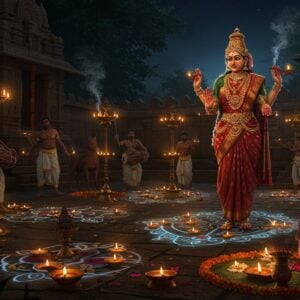
The story of Yudhishthira and the dog is a timeless tale from the Mahabharata, deeply woven into the fabric of Indian tradition and cultural values. Found in the epic’s final book, the Mahaprasthanika Parva, this narrative unfolds after the Kurukshetra war’s dust settles. Yudhishthira, accompanied by his brothers and wife, Draupadi, chooses to relinquish their kingdom and embark on a pilgrimage to the Himalayas. This journey is more than just a physical trek; it symbolizes the ultimate spiritual quest, a path towards shedding earthly attachments and embracing the ephemeral nature of life.
The Journey to the Himalayas
As the Pandavas commence their final journey, a dog joins their ranks, becoming a poignant symbol of dharma and unwavering loyalty. In Hindu mythology, dogs are not merely animals; they are revered as protectors and loyal companions, embodying unwavering devotion. Along this arduous path to the Himalayas, Draupadi and Yudhishthira’s brothers—Sahadeva, Nakula, Arjuna, and Bhima—fall one by one, each succumbing to the weight of past sins or lingering attachments. This heart-wrenching sequence serves as a stark reminder of life’s transient nature and the importance of releasing worldly desires on the path to spiritual enlightenment. It underscores the essence of detachment as a crucial step towards self-realization.
The Encounter with the Dog
Amidst the trials and tribulations of the journey, Yudhishthira forges a profound bond with the dog. This connection reflects not only deep compassion but also an unwavering sense of duty. Yudhishthira’s loyalty to the dog highlights his empathy and inherent kindness, underscoring the significance of steadfast duty in one’s life. It is a testament to his unwavering commitment to dharma, even in the face of adversity.
The Final Test at Heaven’s Gate
Upon reaching the threshold of heaven, Yudhishthira encounters a pivotal test orchestrated by Indra, the king of gods. Indra offers him entry into the celestial realm but decrees that the dog cannot enter. This presents Yudhishthira with a profound moral dilemma. He remains steadfast in his commitment to dharma, choosing loyalty to his four-legged companion over the allure of personal gain. This defining decision showcases the strength of his character and his unwavering dedication to righteousness.
Symbolism and Moral Lessons
Yudhishthira’s choice transcends the immediate situation; it reflects the profound principle of prioritizing dharma over personal reward. His actions embody essential values such as loyalty, compassion, and righteousness. These values deeply resonate even in contemporary life, serving as reminders of the ethical dilemmas we face and the courage needed to uphold our convictions. The story suggests that true virtue lies in extending kindness to all beings, emphasizing the importance of compassion and empathy as fundamental human qualities.
Cultural and Religious Impact
This poignant tale has left an indelible mark on Indian culture, influencing Hindu rituals, inspiring other Indian epics and folklore, and finding expression in various artistic forms. Its enduring appeal is a testament to the power of stories to convey timeless wisdom. The narrative continues to inspire contemporary audiences in their pursuit of moral integrity, guiding them on a path of righteousness and ethical living.
Reflecting on Yudhishthira’s Legacy
The narrative of Yudhishthira and the dog transcends mere storytelling; it serves as a beacon of wisdom and virtue. As we navigate the complexities of life, much like Yudhishthira’s pilgrimage, we are called to remain steadfast in our commitment to loyalty, compassion, and duty. These enduring values, deeply cherished within Indian culture, underscore the significance of making choices that align with dharma. By embracing these lessons, we cultivate lives marked by righteousness and empathy, ensuring that our paths are both meaningful and harmonious. Let this story serve as a catalyst for self-reflection, inspiring us to honor the timeless power of tradition and moral integrity.
Poojn.in: Supporting Your Spiritual Journey
Yudhishthira’s unwavering devotion to dharma resonates deeply with the values we uphold at Poojn.in. Just as Yudhishthira valued his loyal companion, we value providing you with authentic and high-quality ritual items that connect you to the heart of these timeless stories. Our collection includes sacred texts like the Madhumay Padma Gita (Bengali version), exquisite idols such as the Silver Kamdhenu Cow and Calf Idol, and comprehensive Shola Malas – everything you need to enrich your spiritual practices. We understand that choosing the right items can be a deeply personal journey. Therefore, we encourage you to reach out to us. Call us at 03369029784 or WhatsApp us at 9476142738 for personalized guidance. We are here to support you in honoring tradition and deepening your connection to these sacred stories.
Exploring Dharma: Frequently Asked Questions
What is the essence of the story of Yudhishthira and the Dog? The story, nestled within the Mahabharata, recounts Yudhishthira’s final journey to heaven with his brothers, followed by a loyal dog. At heaven’s gate, he faces a crucial test of his commitment to Dharma, forced to choose between entering heaven alone or remaining loyal to the dog.
Why does the dog hold such significance in the story? The dog isn’t merely a pet; it embodies loyalty, dharma itself, and unwavering devotion. Yudhishthira’s refusal to abandon the dog, even at the cost of entering heaven, showcases his steadfast adherence to righteousness and deep compassion.
What symbolism does the dog carry in Hindu mythology? In the rich tapestry of Hindu mythology, dogs are often associated with loyalty, faithfulness, and the embodiment of dharma. In Yudhishthira’s story, the dog serves as a powerful symbol of the moral tests we encounter in life, testing our commitment to these cherished values.
Was Yudhishthira truly forced to choose between Dharma and the Dog? Yes, the narrative presents a stark choice for Yudhishthira. He could enter heaven, leaving the dog behind, or remain true to his principles of dharma and compassion, insisting that the dog accompanies him, potentially forfeiting his own entry.
Do we know the name of Yudhishthira’s dog? Interestingly, the Mahabharata doesn’t explicitly name the dog. The narrative emphasizes the dog’s symbolic significance and the moral test it represents for Yudhishthira, not its individual identity. The focus remains squarely on the profound principles at play.
Why is this particular test regarded as Dharma’s Ultimate Test? This encounter is considered the ultimate test of dharma because it challenges Yudhishthira’s dedication to righteousness in its purest form. It tests whether he will uphold dharma even when faced with the ultimate reward – eternal bliss in heaven.
How does Yudhishthira’s decision illuminate his character? Yudhishthira’s unwavering refusal to abandon the dog unveils his profound integrity, compassion, and unwavering commitment to dharma. It paints a vivid picture of his selflessness and extraordinary moral fortitude.
What enduring lesson can we glean from the story of Yudhishthira and the Dog? This timeless story teaches us the paramount importance of staying true to our principles, regardless of how challenging the circumstances may be. It underscores the values of unwavering loyalty, profound compassion, and steadfast righteousness.


